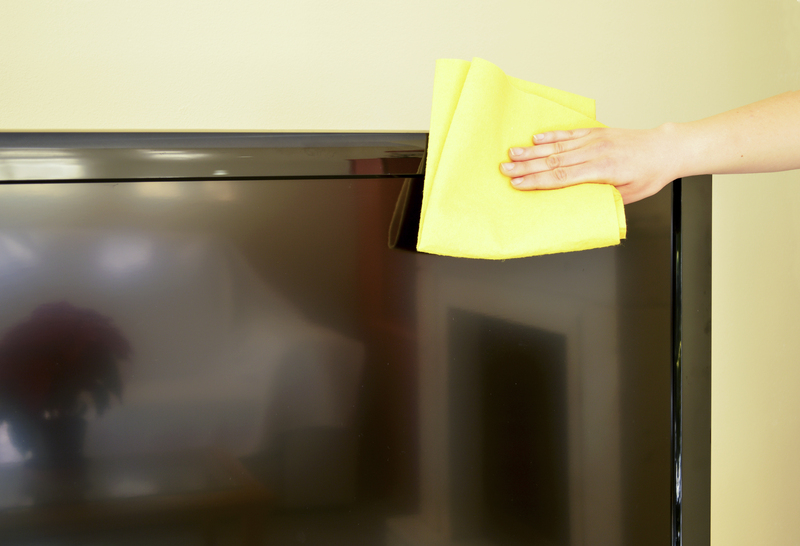Simple Yet Effective Jewelry Cleaning Methods
Posted on 23/09/2025
Simple Yet Effective Jewelry Cleaning Methods
Jewelry, whether it's a precious diamond ring, a cherished gold necklace, or a fun costume piece, adds a special touch to our style. However, daily wear, exposure to lotions, sweat, and the environment can leave your favorite pieces looking dull or dirty. Fortunately, effective jewelry cleaning methods don't have to be costly or time-consuming. In this comprehensive guide, you'll discover simple yet powerful ways to clean jewelry safely at home, keeping your treasured items sparkling for years to come.
Why Clean Your Jewelry Regularly?
Before diving into the simple jewelry cleaning techniques, it's important to understand why regular cleaning is essential. Over time, grime, oil, dust, and even bacteria can accumulate on your jewelry, dulling its shine and potentially causing skin irritation. Proper care not only maintains your jewelry's luster but also prolongs its lifespan by preventing build-up that could lead to discoloration or damage.
- Hygiene: Dirt and sweat can harbor bacteria, leading to skin issues.
- Longevity: Regular cleaning helps prevent tarnishing and erosion.
- Aesthetics: Clean jewelry always looks more beautiful and appealing.

The Basics: Understanding Different Jewelry Types
Not all jewelry is made equal. Gold, silver, precious stones, pearls, and costume jewelry each require different care approaches. Using the wrong cleaning method could cause more harm than good! Here's a brief breakdown:
- Gold and Platinum: Durable metals but can scratch with harsh cleaning.
- Silver: Prone to tarnishing, often needs frequent gentle cleaning.
- Pearls: Extremely delicate; only use the mildest cleaners.
- Gemstones: Hard, but some (like opal or emeralds) are susceptible to heat and chemicals.
- Costume Jewelry: Typically made of non-precious metals, sometimes glued; avoid soaking.
Simple Yet Effective Jewelry Cleaning Methods You Can Trust
Let's explore several tried-and-true jewelry cleaning techniques that you can use at home, organized by jewelry type. All of these are easy to do, use household products, and are safe when done correctly.
1. Gentle Dish Soap Solution for Everyday Jewelry
This is one of the best jewelry cleaning methods for gold and most gemstones (except for pearls and delicate pieces).
- Mix a few drops of mild dish soap with lukewarm water in a bowl.
- Soak your jewelry for 10-20 minutes. This loosens dirt and oil.
- Use a soft-bristle toothbrush to gently scrub intricate details. Don't use too much force.
- Rinse thoroughly with lukewarm water.
- Pat dry with a soft, lint-free cloth.
Tip: Make sure your sink's drain is plugged before rinsing!
2. Baking Soda and Water Paste for Cleaning Silver Jewelry
Silver jewelry is gorgeous but can tarnish quickly. A simple mix of baking soda and water is a highly effective jewelry cleaning method for silver items.
- Mix three parts baking soda with one part water to form a paste.
- Apply the paste to your silver jewelry using a soft cloth or sponge.
- Gently rub along the grain of the silver to avoid scratching.
- Rinse thoroughly in cool water.
- Buff with a clean, dry cloth for a brilliant finish.
Note: Avoid this method on silver jewelry set with soft stones like turquoise or pearls.
3. Aluminum Foil and Baking Soda Bath for Heavy Tarnish
If your silver pieces have stubborn tarnish, this method uses a chemical reaction to clean them.
- Line a bowl with aluminum foil, shiny side up.
- Add one tablespoon of baking soda and one tablespoon of salt per cup of hot water.
- Place your jewelry on the foil and pour the solution over it.
- Let it sit for 3-5 minutes.
- Remove jewelry, rinse, and buff dry.
Warning: This deep-cleaning jewelry technique is not suitable for gemstones, pearls, or antique pieces with fragile settings.
4. Ammonia Solution for Extra Sparkle (Use with Caution!)
For diamond jewelry or durable gold pieces that have lost their luster, a diluted ammonia solution can restore brilliance.
- Mix one part ammonia with six parts water.
- Soak jewelry for no more than one minute.
- Rinse thoroughly and dry with a lint-free cloth.
Caution: Never use ammonia on pearls, platinum, or soft gemstones as it can cause irreparable damage.
5. Vinegar Solution for Gold Jewelry
Plain white vinegar can effectively clean solid gold pieces (without any stones).
- Soak your gold jewelry in a bowl of vinegar for 10-15 minutes.
- Gently scrub with a soft toothbrush if needed.
- Rinse with warm water and dry thoroughly.
*Warning: Do not use vinegar on gemstones, plated, or costume jewelry, as it can harm finishes or loosen adhesives.*
6. Steam Cleaning Jewelry at Home (For Durable Pieces Only)
Steam cleaning is an advanced jewelry cleaning technique that uses compressed steam to dissolve dirt and kill bacteria. Home steam cleaners and even a tea kettle can provide the necessary steam.
- Hold the jewelry with tweezers or tongs over steam for 10-15 seconds.
- Gently wipe dry with a clean cloth.
Do not use on: Porous stones, pearls, glued jewelry, or older, fragile pieces.
7. Toothpaste: Myth or Miracle?
Toothpaste is often touted as a quick fix, but using toothpaste to clean jewelry can scratch precious metals and softer gemstones. Only use non-gel white toothpaste on hard stones like diamonds, and always test on a small area first.
8. Professional Jewelry Cleaning Cloths
For a quick, safe and simple clean of all types of jewelry, invest in a professional jewelry polishing cloth. These cloths are infused with micro-abrasives and sometimes anti-tarnish agents.
- Gently rub your jewelry to restore shine and remove light tarnish or fingerprints.
- Perfect for gold, silver, and costume jewelry.
Special Care: Cleaning Pearls & Delicate Gemstones
Pearls and certain gemstones (like opals, turquoise, and amber) are highly sensitive to chemicals, heat, and even water. Here's how to clean these vulnerable jewelry pieces:
- Wipe pearls with a very soft, damp cloth after each wear.
- Never submerge in water or use abrasives.
- Let strands air dry flat before storing to avoid stretching the cord.
- For all delicate stones, use only mild soapy water and a very soft brush, then dry immediately.
Effective Jewelry Cleaning for Costume Jewelry
Because costume jewelry is often plated and may be glued, excess moisture can cause tarnishing or loosen stones. Stick to these safe cleaning methods for costume jewelry:
- Wipe with a slightly damp, lint-free cloth. Never submerge.
- For stubborn spots, use a cotton swab dipped in diluted dish soap.
- Dry thoroughly and store away from humidity.
Additional Tips for Keeping Jewelry Sparkling Longer
- Remove jewelry when swimming, showering, or applying lotions and perfumes.
- Store pieces separately in soft pouches or lined boxes to prevent scratches.
- Check clasps and stones regularly to ensure settings are secure.
- Get professional cleanings and inspections for valuable items each year.
What Not to Do: Jewelry Cleaning Mistakes to Avoid
- *Never use bleach or abrasives*; they can pit or discolor most metals and gems.
- *Don't use hot water on delicate stones* or glued settings.
- *Avoid ultrasonic cleaners* for soft or treated gemstones, as vibration can fracture them.
- *Never dry with paper towels*, which can scratch delicate surfaces.

Frequently Asked Questions About Jewelry Cleaning
How often should I clean my jewelry?
Ideally, clean items you wear daily (like rings and earrings) every two weeks. For heirlooms or occasional jewelry, once every couple of months should suffice.
Can I use commercial jewelry cleaners?
Many commercial cleaners are safe for specific types but *always read the label*. Avoid those containing ammonia or acid for pearls, opals, and antique items.
Is it safe to use ultrasonic jewelry cleaners at home?
Ultrasonic cleaners are effective for diamonds, gold, and platinum, but can loosen stones in older pieces and damage many colored gems. *Consult your jeweler first!*
Conclusion: Keep Your Jewelry Glowing With Simple, Effective Cleaning
Maintaining the brilliance of your favorite necklaces, rings, and bracelets doesn't require expensive products or time-consuming routines. With these simple yet effective jewelry cleaning methods, you can easily care for gold, silver, pearls, gemstones, and costume jewelry right at home. By cleaning your jewelry regularly with the appropriate technique and a little care, you'll ensure every sparkle stands the test of time. Remember: Gentle methods, consistency, and proper storage are the keys to enjoying beautiful jewelry for years to come.
Ready to give your jewelry new life?
With these expert tips and home cleaning tricks, your jewelry will always be ready to shine, no matter the occasion. For valuable or sentimental pieces, don't forget periodic professional cleanings to keep them in pristine condition.
```




